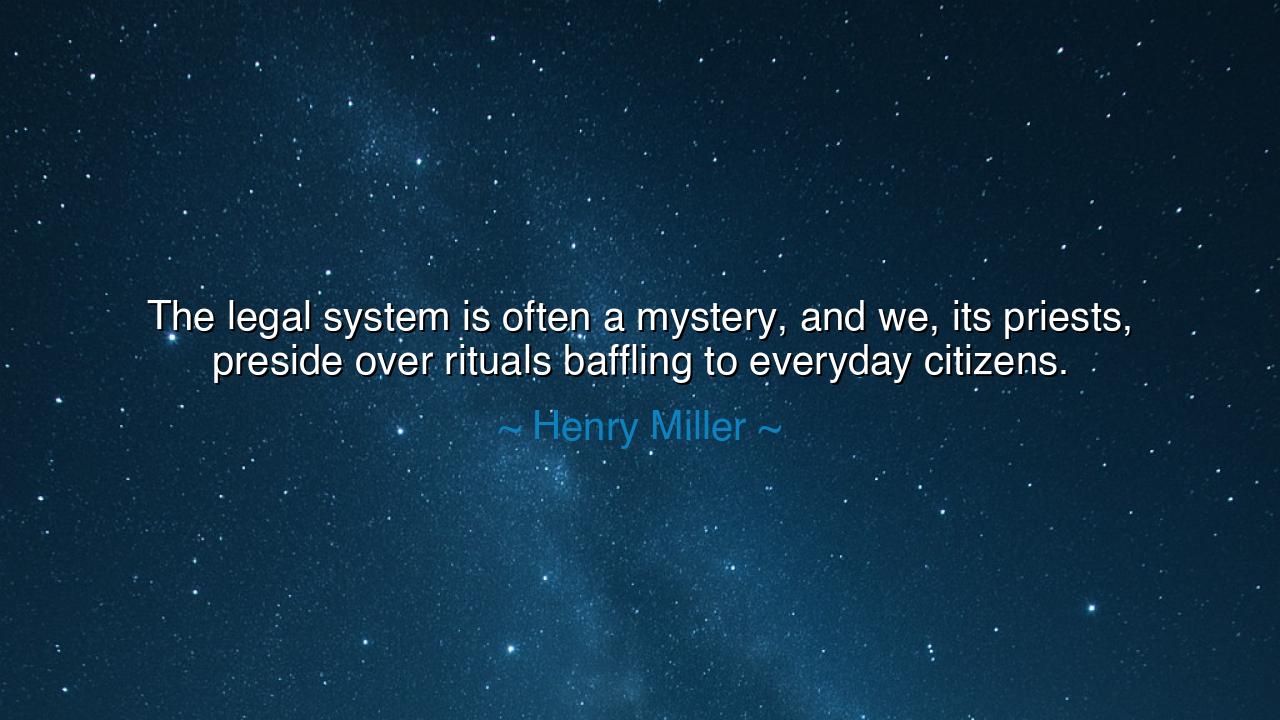
The legal system is often a mystery, and we, its priests, preside
The legal system is often a mystery, and we, its priests, preside over rituals baffling to everyday citizens.






Hear the words of Henry Miller, who, though known as a novelist of the human soul, spoke here of law with both irony and truth: “The legal system is often a mystery, and we, its priests, preside over rituals baffling to everyday citizens.” In this saying, he casts the law not as a beacon of clarity, but as a temple veiled in shadow, where language is arcane and process resembles sacred rite. He reminds us that though law is meant to serve the people, it often becomes alien to them, a world closed off by complexity and guarded by those trained in its secrets.
At the heart of this quote is the recognition that the legal system speaks in tongues foreign to ordinary life. Its codes, precedents, and procedures—crafted over centuries—form a structure of reason, yet one so dense that those outside its walls feel excluded. To the citizen, a trial or a contract may appear less as justice plainly spoken, and more as a ritual, where robes and oaths replace simple understanding. Thus Miller compares lawyers and judges to priests, guardians of a sacred text whose meanings are revealed only through their interpretation.
History gives many examples of this. In medieval Europe, law was entwined with the Latin of the Church, unintelligible to peasants and townsfolk. Only the learned clerics could interpret it, and so law became not a shared covenant but a mystery administered from above. Even in more recent times, courts have cloaked themselves in archaic procedure: wigs in England, arcane Latin maxims in many nations, and ceremonies that elevate law above the reach of the common mind. These rituals, while preserving tradition, have often widened the gulf between the people and the justice they seek.
Consider also the trial of Socrates, in ancient Athens. Though Athens prided itself on democracy, Socrates was condemned in a proceeding where rhetoric and ritual outweighed truth. To the citizens watching, the process may have seemed less about justice and more about performance—a priesthood of orators commanding destiny. Miller’s words resonate here, for the law, rather than being a clear mirror of justice, became a mystery that silenced a philosopher and enshrined the will of the crowd.
The wisdom in Miller’s words is not to scorn the law entirely, but to caution us: when law becomes too mysterious, it loses its legitimacy. For justice must be understood to be trusted. If citizens see law as a baffling ritual, performed by priests in hidden chambers, they will feel alienated, even oppressed, by the very system meant to protect them. What is sacred in law should be its fairness, not its obscurity. What should inspire awe is its justice, not its jargon.
Yet his words also remind us of the responsibility of the priesthood of law. Lawyers, judges, and scholars are entrusted with a noble duty: to translate complexity into clarity, to bring light into the temple, and to ensure that ordinary people can find their way to justice without fear or confusion. When they fail, they risk turning law into superstition, where citizens comply out of fear rather than conviction. When they succeed, they honor the true spirit of law, which is not mystification but protection.
Therefore, children of tomorrow, take Henry Miller’s warning to heart. Do not allow justice to be hidden in mystery. Demand clarity from your courts, transparency from your rulers, and simplicity from your laws. And if you walk the path of the legal priesthood, do not revel in obscurity, but act as interpreter and guide. For the law is not meant to be a riddle, but a shield. It must be known to be trusted, and trusted to be obeyed. In this way, the rituals of justice may cease to baffle and instead inspire confidence, drawing all people into the covenant of fairness that sustains a free society.






AAdministratorAdministrator
Welcome, honored guests. Please leave a comment, we will respond soon